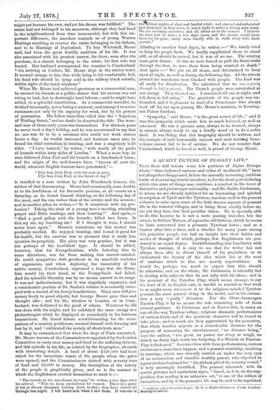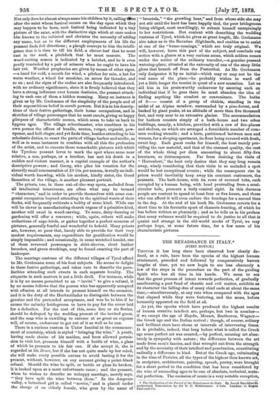A QUAINT PICTURE OF PEASANT LIFE.* THAT there still remain
some few portions of Alpine Europe where "time-hallowed customs and relics of medimval life" have not altogether disappeared, before the annually increasing, ruthless horde of desecrating tourist invaders, is, for the short period during which this state of things may continue, a comfort to the lover of distinctive and picturesque nationality ; and Mr. Baillie Grohmann, to whom we are already indebted for an interesting and spirited description of Tyrol and the Tyrolese, has done well in his present volumes to seize upon some of the little-known aspects of peasant life in the remoter villages, and to bring them vividly before us, ere yet they have lost their peculiar charm. He is specially able to do this because he is not a mere passing traveller, but the owner, in Schloss Matzen, of a genuine old fortress, which he seems to have converted into a pleasant Tyrolean home ; and as a hunter after bric-h-brac, and a dweller for many years among this primitive people, has had an insight into their habits and modes of thought of which, perhaps, few Englishmen are pos- sessed in an equal degree. Notwithstanding this familiarity with Tyrolese customs, it is easy to see that the writer has not always been able to divest himself of his prejudices, or to understand the beauty of the idea which lies at the root
of customs which to him are merely superstitions. It would be, perhaps, too much to expect that this should be otherwise, and on the whole, Mr. Grohmann is tolerably fair in dealing with subjects that do not tally with his ideas ; and in his account of the Paradise Play, which seems strange, to say the least of it, to English ears, is careful to remind us that what to us might seem irreverent is to the religious-minded Tyrolese peasant the most natural thing in the world, and in his estima- tion a very " godly " diversion. For the Ober-Ammergau Passion-Play is by no means the sole remaining relic of these ancient pastimes. At Christmas and at Easter-tide, in many an out-of-the-way Tyrolese village, religious dramatic performances of various kinds and of the quaintest character will be found to take place; and so much are they appreciated by the peasantry, that whole families migrate to a considerable distance for the purpose of witnessing the entertainment, "no distance being," says the author, "too great, no passes too steep or rough, no march on dusty high-roads too fatiguing, if a Miracle or Passion- Play is their goal." In connection with these performances, curious occurrences sometimes happen, and a peasant courtship, resulting in marriage, which was cleverly carried on under the very eyes of an unconscious and irascible wealthy parent, who objected to a poor student husband for "the richest girl of the country round," is very amusingly described. The peasant almanack, with its quaint pictures and mysterious signs, "based, as it is, OD the sup- position that reading is an unknown art," is one of the oddest of curiosities, and by it the peasant's life may be said to be regulated.
* Gadclinps with a Primitive People. By W. A. &alio Grohmann. 2 vols. London : Remington and Co.
Not only does he almost always name his children by it, calling diem after the saint whose festival occurs on the day upon which they may happen to be born, such festival being indicated by a tiny picture of the saint, with the distinctive sign which at once makes him known to the initiated and obviates the necessity of adding any name, but as to the different employments of his life the peasant finds full directions ; a plough conveys to him the intelli- gence that it is time to till his field, a clover-leaf that he must cast in the seed, a pitchfork that he must manure. The wood-cutting season is indicated by a hatchet, and he is even gently reminded by a pair of scissors when he ought to have his hair cut. Weather prophecies are given by means of other signs, —a hand for cold, a mouth for wind, a pitcher for rain, a hat for warm weather, a wheel for sunshine, an arrow for thunder, and so on ; and the signs of the zodiac are also frequently introduced, with no ordinary significance, since it is firmly believed that they have a strong influence over human destinies, the peasant attach- ing to each one of them a hidden meaning. Many an instance is
given us by Mr. Grohmann of the simplicity of the people and of
their superstitions belief in occult powers. But it is in his descrip- tions of their festive gatherings, their home occupations, and in sketches of village personages that he most excels, giving us happy glimpses of characteristic scenes, which seem to take us back to bygone ages. The village schoolmaster, who combines in his -own person the offices of beadle, sexton, verger, organist, pew- opener, and bell-ringer, and yet finds time, besides attending to his scholastic duties, to enact the parts of village barber and scribe, as well as in some instances to combine with all this the profession -of the artist, and to execute those remarkable pictures with which the Tyrolese peasant loves to mark the spot where some near
relative, a son, perhaps, or a brother, has met his death in a
sudden and violent manner, is a capital example of the author's descriptive powers ; and Georg, who plies his vocation for the absurdly small remuneration of £9 10s. per annum, is really an indi- vidual worth knowing, while his modest, kindly sister, the Good Samaritan of the village, is another pleasant portrait.
'The priests, too, in these out-of-the-way spots, secluded from all intellectual intercourse, are often what may be termed
"characters," and in order to provide themselves with some con- genial occupation beyond attending to the spiritual wants of their flocks, will frequently cultivate a hobby of some kind. While one will be clever in manufacturing church organs of a primitive kind, another will excel in wood-carving. To some, dairy-farming or gardening will offer a resource ; while, again, others will make collections of cage-birds, or gather together a perfect museum of pictures, generally fearful and wonderful to behold. Many priests are, however, so poor that, barely able to provide for their very modest requirements, any expenditure for gratification would be simply impossible ; and occasionally, in some wretched hamlet, one of these reverend personages in shirt-sleeves, short leather breeches, and green stockings, may be found enacting the part of innkeeper.
The marriage customs of the different villages of Tyrol afford to Mr. Grohmann some of his best subjects. He seems to delight
in these festive gatherings, and takes care to describe the pecu- liarities attending such events in each separate locality. The etiquette in such matters is not a little droll. For instance, while
it is by no means permitted to an " invite " to give a refusal, it by no means follows that the person who has apparently accepted with effusion at all intends to present himself on the occasion, and it is the duty of the Hochzeitlader to distinguish between the genuine and the pretended acceptance, and woe be to him if he causes the unlucky bridegroom to have to pay for the cover laid for a defaulter. For the cost of this, some five or six florMs, should be defrayed by the wedding present of the invited guest, and the MaJ1 who is unwilling to carouse at so great an expense will, of course, endeavour to get out of it as well as he can.
There is a curious custom in Unter Innthal at the commence- ment of courtship, which is styled "bringing the wine." A youth, having made choice of his maiden, and been allowed permis- sion to visit her, presents himself with a bottle of wine, a glass of which he presents to his fair one. If she accept it, she is regarded as his Bract, but if she has not quite made up her mind, she will make every possible excuse to avoid tasting it for the present, without, however, on any account giving a point-blank refusal. Should the wine be spilt, or bottle or glass be broken, it is looked upon as a most unfortunate omen ; and the peasant, when he wishes to describe an unhappy marriage, merely says, "they have spilt the wine between them." In the Ampezzo valley, a betrothed girl is called "novice," and is placed under the charge of an elderly female, who goes by the name of " brontola," "the growling bear," and from whose side she nay not stir until the knot has been happily tied, the poor bridegroom being obliged, most unwillingly, to submit himself unrepiningly to her restrictions. Not content with describing the wedding
customs of Tyrol, which-he gives at great length, Mr. Grohmann also takes us to the Bavarian Highlands, and enables us to assist at one of the "home-comings," which are truly original. We will, however, leave this part of the subject, and conclude our notice with a glance at a very curious scene, which seldom comes under the notice of the ordinary traveller,—a genuine peasant watering-place, situated at the extremity of one of the steep little lens that branch off from the PusterthaL As Mr. Grohmann only designates it by an initial—which may or may not be the real name of the place—he probably wishes to ward off yet a little longer the tourist in quest of a new sensation. Let us aid him in his praiseworthy endeavour by assuring such an individual that if he goes there he must abandon the idea of finding anything like comfort or convenience. The baths of 5— consist of a group of chalets, standing in the midst of an Alpine meadow, surrounded by a pine-forest, and backed by giant peaks, at an altitude of more than five thousand feet, and very near to an extensive glacier. The accommodation for bathers consists simply of a bath-house and two other buildings, namely, a kitchen, provided with a row of fire-places and shelves, on which are arranged a formidable number of com- mon cooking utensils ; and a barn, partitioned between men and women, for a sleeping apartment, its floor being covered with fresh, sweet hay. Each guest cooks for himself, the host merely pro- viding the raw material, and that of the coarsest quality, the cod of the whole thing per diem amounting to about fifty-five kreutzers, or thirteenpence. Far from desiring the visits of " Herrenleut," the host only desires that they may long remain away, wisely considering that their visits to so secluded a spot would be but exceptional events ; while the consequent rise in prices would inevitably keep away his constant customers, the peasants. The bath-house, with its rows of covered tubs, each occupied by a human being, with head protruding from a semi- circular hole, presents a turly comical sight. In this durance people are content to spend at least four or five hours, and those who can afford it will even endure the bondage for a second time
in the day. At the end of his book Mr. Grohmann reverts for a short time to his favourite sport of chamois-hunting, of which he has before written so pleasantly ; and as he tells us in his preface
that many volumes would be required to do justice to all that is quaint and strange in the old-world nooks of Tyrol, we may perhaps hope, at some future time, for a few more of his characteristic pictures.



































 Previous page
Previous page